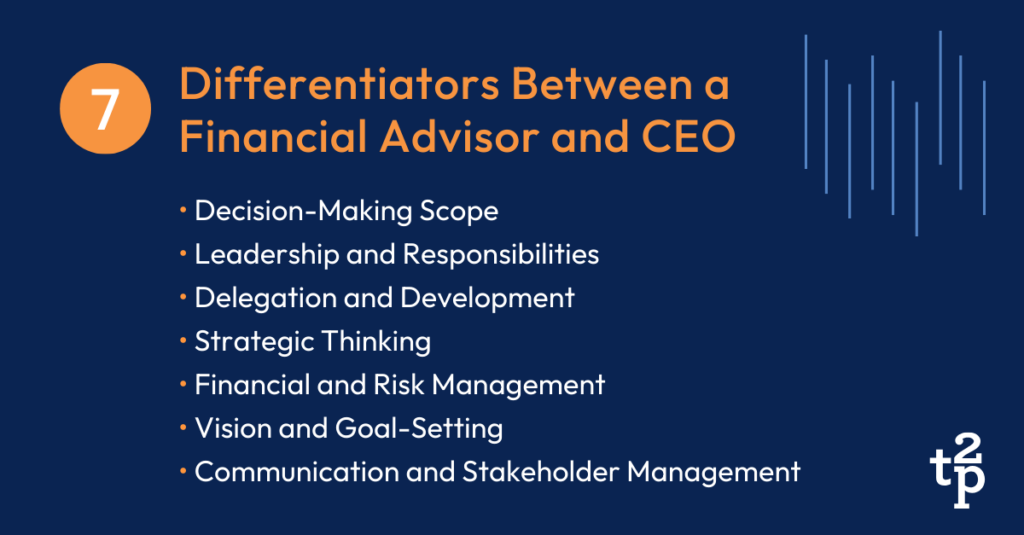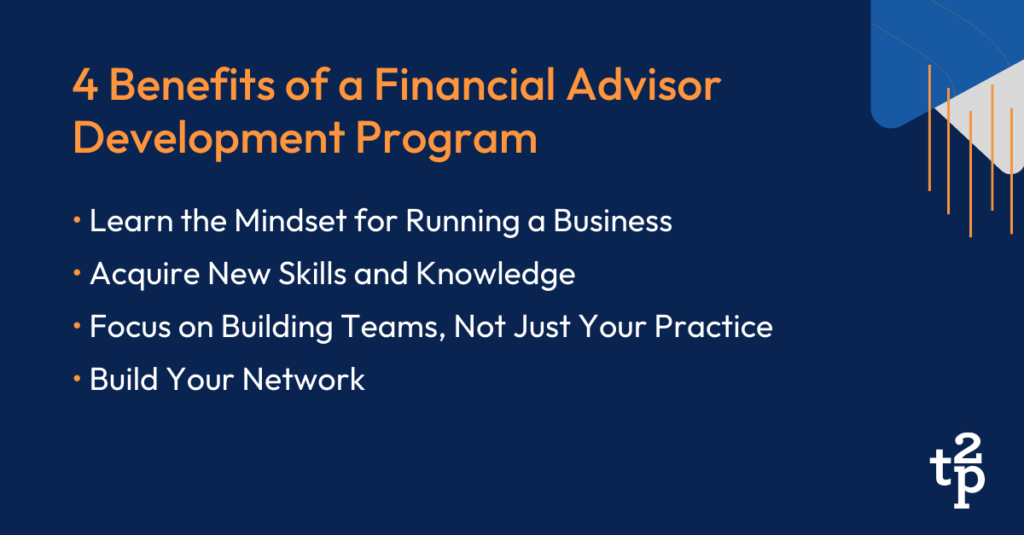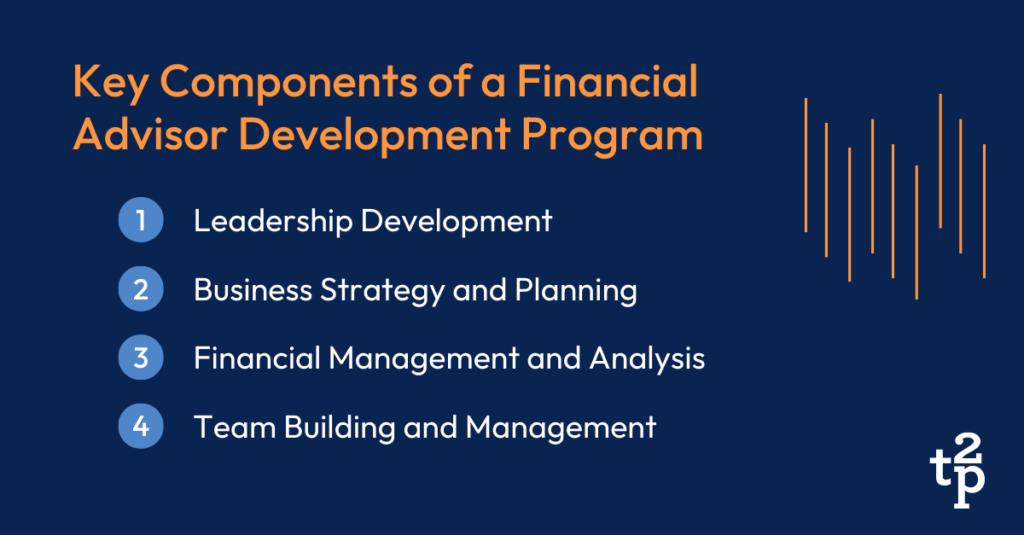Becoming a successful financial advisor is a significant achievement. But at some point, many advisors want to take the next step and lead their own firm. Don’t underestimate the shift from financial advisor to CEO. To transition successfully, you need a financial advisor development program that helps you build the mindset, skills and habits of a CEO and business owner.
CEOs aren’t just financial advisors; they’re also the visionary leaders who guide the entire organization toward growth and success. They have greater decision-making authority but also greater responsibilities and challenges. Clients still matter, but these leaders must also set strategy; communicate goals, vision and values; and inspire their teams to achieve their potential.
Learn more about common elements of financial advisor career growth, the challenges in becoming a CEO and how to develop the skills necessary to build your business.

7 Differences Between a Financial Advisor and CEO
The shift from financial advisor to CEO requires changes in behaviors, skills and responsibilities. This change, notably, starts with you. “If I want my organization to change, it begins with me changing my behavior first,” says Chuck Wachendorfer, president, sales distribution, and an executive coach at think2perform. “So which behaviors do I have to change? And by how much?”
Decision-Making Scope
Financial advisors primarily focus on making informed decisions for their clients’ financial well-being. CEOs also make decisions that affect clients, but they must also think about the entire organization.
Financial advisors and CEOs both rely on long-term vision, strategic goals and stakeholder interests, but not necessarily at the same scale. That said, even a sole proprietorship can run into decision-making bottlenecks. When that occurs within a team or a company, you risk losing out on key business opportunities and frustrating your top performers.
Leadership and Responsibilities
Financial advisors typically work independently or in small teams. As CEOs, however, they must lead the entire organization along with directly overseeing key employees. They set the tone for the culture, including default behaviors, ethics and risk tolerance.
CEOs need strong leadership skills at multiple levels. At the highest level, they must set strategy, practice values-based leadership, explain the vision and inspire their people. CEOs also must lead by example. Everyone watches what they do and say, including whether those behaviors align with their values.
Delegation and Development
Another part of financial advisor growth is learning how to delegate. Successful financial advisors understand the six key activities of building a practice, including lead generation, case analysis and client service. “Those six are still important, but they don’t necessarily have to be done by you,” Wachendorf says.
CEOs also must hire effectively and develop their people so they stay, grow and advance within the business. “Development matters more than selection. So developing your people matters more than getting the right person in the right seat,” Wachendorfer says.
“You hire people for their talent and experience, but you’ve got to train them and develop them to do well in the job,” he adds.
Strategic Thinking
Financial advisors excel in providing tactical advice and executing investment strategies. CEOs must extend that mindset and skill set to drive the overall direction of the organization.
These can be similar, in that both individual advisors and CEOs will look at benchmarks but ultimately make judgment calls about when and how to deviate from those norms. The roles differ, however, in that CEOs must consider a wider range of stakeholders across a wider range of decisions.
Financial and Risk Management
Financial advisors focus on managing their clients’ portfolios in line with their needs, best practices, and ethical and legal guidelines. CEOs do the same, except their client is the business. They must work with key executives to drive overall financial health, including budgeting and forecasting.
The incentives around financial decision-making also differ when you’re an advisor versus a CEO. Advisors have targets to strive for, but they aren’t necessarily setting those targets or choosing how to structure them. CEOs, by contrast, are ultimately responsible for compensation and bonus programs within their organizations — and communicating them.
Vision and Goal-Setting
Financial advisors work closely with clients to understand their financial goals and develop personalized strategies that align client values with behaviors. Advisors also have individual goals, often related to job performance or career aspirations.
CEOs have goals for themselves and key stakeholders, too, but they also must define the company’s mission, establish strategic objectives and communicate a clear direction to all stakeholders. CEOs must inspire others with their vision and rally the team toward achieving ambitious goals. Unfortunately, all too often, most of your employees don’t know the organization’s top three goals — if they even know their team or individual goals.
Many organizations say they have a mission, vision and values, but ask the average employee to name them, and they can’t. These businesses leave tremendous value on the table, says Ray Kelly, senior vice president and consultant at think2perform. “People that know the vision, mission and values are 51 times — not 51% — 51 times more likely to be fully engaged than the people who cannot state them,” he says.
Communication and Stakeholder Management
Financial advisors excel in building relationships with clients. CEOs must effectively communicate with a wider range of stakeholders, including clients, employees, the board, regulators and the public. They must possess excellent communication skills to articulate the company’s vision, address concerns and maintain trust.
“People need your leadership, helping them control direction and throw off discouragement,” Wachendorfer says. “If I’m not spending any time with my team, I can’t help them do that.”

4 Benefits of a Financial Advisor Development Program
Effective financial advisor development programs help advisors develop the skills and knowledge necessary to excel as executives and business owners. Participants can accelerate career growth, improve their leadership skills, and gain the confidence and credibility needed for higher-level responsibilities.
Here are four aspects of financial advisor growth to expect from these development programs..
Learn the Mindset for Running a Business
While financial advisors excel in providing tactical advice and executing investment strategies, they might not have the skills, knowledge or experience to think strategically at the organizational level, much less lead teams. The good news is that they can learn how to think and act like a CEO with the right development efforts.
Part of running a business is changing the dynamic of client relationships. Instead of personality-driven client relationships, you institutionalize the relationship with your firm.
Acquire New Skills and Knowledge
A financial advisor development program can help advisors improve their ability to lead, think strategically, understand the business and build teams. These programs should help financial advisors gain a deeper understanding of business planning, including how to analyze market trends, identify growth opportunities and develop long-term strategies.
Such development efforts also can accelerate financial advisors’ business acumen. Besides understanding how to help clients improve their investment behaviors, they’ll also learn how to manage the financial health of entire organizations, including budgeting, forecasting, and acquiring and retaining clients.
Focus on Building Teams, Not Just Your Practice
A financial advisor development program emphasizes the importance of building and managing high-performing teams. Financial advisors learn how to foster collaboration, delegate tasks and create a supportive work environment. These skills are crucial for CEOs and business owners, especially for advisors who have had little management experience in their careers.
Build Your Network
Participating in a financial advisor development program provides advisors with valuable opportunities to connect with and learn from coaches, industry leaders, successful CEOs and fellow participants.
These activities aren’t so different from the work advisors already do to develop new business. But rather than just trying to find new business for themselves, these connections can lead to mentorships, business opportunities and new hires, along with invaluable lessons from people who have gone through the financial advisor-to-CEO journey.

Key Components of a Financial Advisor Development Program
To achieve the transformational growth necessary to move from financial advisor to CEO, you need to understand why your role has to change, then figure out how that happens. If you’re trying to develop into a business owner, here are some of the components you should find in a financial advisor development program.
Leadership Development
These programs should help financial advisors assess their current leadership capabilities and what matters most to them. A values exercise can be especially helpful for identifying the advisor’s values and comparing those to existing and desired behaviors.
These programs usually offer training to help advisors understand leadership principles, improve problem-solving, and learn how to hire and develop staff in alignment with business goals and values.
Business Strategy and Planning
Great financial advisors already know their industry inside and out. They can build on that knowledge by learning what changes when they are responsible for developing and leading the entire business. Lessons here can cover areas such as market analysis, competitive positioning, creating and executing business plans, and how to respond to disruption and unexpected events.
Financial Management and Analysis
Much like with strategy, financial advisors aren’t learning from scratch about financial management. However, they’re likely exploring things like financial statements, budgeting, forecasting, and key performance indicators from a different perspective and at a bigger scale.
Financial advisors should leave these programs with the ability to interpret business-wide financial data, assess an organization’s financial health and communicate financial insights to stakeholders.
Team Building and Management
Financial advisor development programs should help participants learn the skills needed to build and manage high-performing teams. These budding leaders and business owners should come away with the building blocks for hiring well, developing and mentoring employees, resolving conflicts and creating a positive work culture.
Financial advisors also need to hone their communication and delegation skills. They can’t do all the work; they need to create a cohesive team that understands the mission, values and vision and can act accordingly for the overall success of the organization.
Move From Financial Advisor to CEO
Developing from a financial advisor to a CEO won’t be easy, as it requires transformational growth.. “Changing oneself is one of the most difficult things you can do,” Kelly says. “Simple, but not easy. But the first thing is becoming aware of it.”
If you’re looking to take the next step in your career and not only impact your clients but also every client of every person in your team and company, consider how a financial advisor development program can get you the skills, mindset and opportunities you need.As you look to increase your aptitude as a leader, team builder and people developer, we can help. Take the next step toward becoming a CEO. Learn more about our Transformation Growth Series.



